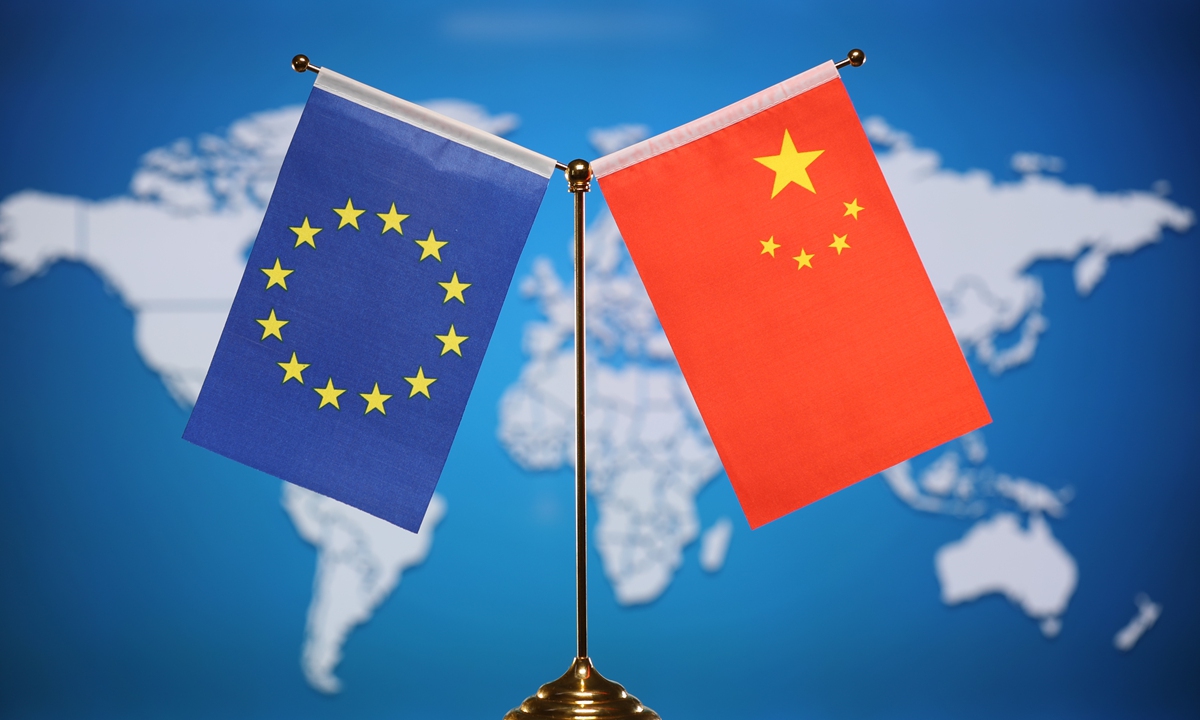
China EU Photo:VCG
Since China’s announcement earlier this month of plans to restrict rare earth exports, European Commission President Ursula von der Leyen said that in the short term, Brussels is focusing on finding solutions together with its Chinese counterparts, but added that the EU is prepared to “use all instruments” at its disposal to respond if necessary, Bloomberg reported. Experts said on Sunday that the bloc should avoid “taking an arbitrary approach” and instead resolve differences through rational dialogue based on bilateral relations rather than bloc confrontation.
Chinese experts said that the EU’s approach to China’s rare-earth measures as self-contradictory and inconsistent. They urged the EU to avoid politicizing the issue and resolve differences through rational talks, stressing that cooperation — not threats — serves both sides’ interests.
Von der Leyen’s remarks come days after French President Emmanuel Macron told EU leaders to consider using the so-called anti-coercion instrument — the bloc’s most powerful trade tool — against China if they aren’t able to find a resolution to Beijing’s planned export controls on critical raw materials, Bloomberg reported.
The tool, known as Anti-Coercion Instrument, has never been used. It was designed primarily as a deterrent, and if needed, to respond to deliberate coercive actions from third countries that use trade measures as a means to pressure the policy choices of the EU or its members, Bloomberg reported.
Von der Leyen also warned that while China’s move on rare earths is part of “wider economic friction” between the US and China, it has a “big impact” on Europe, noting that 90 percent of the region’s consumptions of rare earth magnets are China imports, Bloomberg reported.
Cui Hongjian, director of the Department of European Studies, China Institute of International Studies, told the Global Times that the EU’s stance toward China’s rare-earth export measures could be described as “a mix of soft and hard tactics.” “On the one hand, Europe’s high dependence on Chinese rare-earth supplies — both through direct imports and indirectly via technological links with US companies — makes it eager to seek dialogue and possibly special arrangements with China,” Cui said. “On the other hand, its coordination with Washington has led it to consider collective pressure, creating a rather complex and contradictory position.”
Cui added that China’s position is clear: Beijing opposes politicizing the issue or using it as a tool for bloc confrontation.
“Rare earths concern national and global supply chain security and should be addressed through rational communication and pragmatic solutions,” he said. “China is willing to discuss specific technical issues with the EU on the basis of mutual respect, but opposes any form of collective pressure.”
Zhou Mi, a senior researcher at the Chinese Academy of International Trade and Economic Cooperation, told the Global Times on Sunday that China and the EU share many common interests — including a firm commitment to multilateralism, free and open trade, and extensive cooperation in industries such as automobiles, semiconductors and agriculture.
“Given the restructuring of global supply chains and rising protectionism, both sides have every reason to strengthen dialogue to safeguard their development interests and security,” Zhou said.
“Using so-called tools or threats won’t help resolve differences,” Zhou said. “China has always responded to pressure with rationality and dialogue, rather than concession. The key is to establish effective communication channels to prevent issues from escalating.”
Zhang Jian, a vice president of the China Institutes of Contemporary International Relations, told the Global Times that Europe should view China and bilateral ties through a lens of cooperation rather than confrontation. “Geopolitical thinking has already trapped Europe in economic difficulty,” Zhang said. “If this continues, its problems will only deepen. Europe needs rationality, not threats — because threats will only backfire.”
In recent days, Chinese authorities have issued responses regarding rare-earth export controls.
China’s Commerce Minister Wang Wentao held a meeting via video link with EU Commissioner for Trade and Economic Security Maros Sefcovic at the latter’s request on Tuesday, during which both sides had in-depth exchanges of views on key China-EU economic and trade issues, including export controls and the EU’s anti-subsidy case on Chinese electric vehicles, according to the Ministry of Commerce (MOFCOM).
Regarding rare-earth export controls, Wang said that China’s recent measures are a normal practice to improve its export control system in accordance with laws and regulations, reflecting China’s responsibility as a major country in safeguarding world peace and stability. He added that China is committed to maintaining the security and stability of global supply chains and has consistently provided approval facilitation for EU companies.
Both sides agreed, in line with the consensus reached at the 25th China-EU Summit in Beijing in July, to hold an “upgraded version” of the China-EU export control dialogue mechanism meeting in Brussels as soon as possible.
In response to a question that EU’s trade chief Maros Sefcovic said that Chinese and EU trade officials have agreed to hold a meeting in Brussels regarding China’s export controls on rare earths, Chinese Foreign Ministry spokesperson Guo Jiakun said on Wednesday that relevant departments have already released a press statement on the matter, which can be referred to.
We hope the EU will honor its commitment of supporting free trade and opposing trade protectionism, provide a fair, transparent, and non-discriminatory business environment for enterprises from all countries, and take concrete actions to uphold market economy principles and WTO rules, insist that trade differences should be properly resolved through dialogue and consultation, the spokesperson said.
Zhou added that China-EU cooperation should serve as a stabilizing force amid global uncertainty. “If either side succumbs to third-party pressure and takes actions inconsistent with established rules and principles, it would undermine trust and trade stability,” Zhou said. “Seeking strength through coercion is neither appropriate nor sustainable.”
Global Times